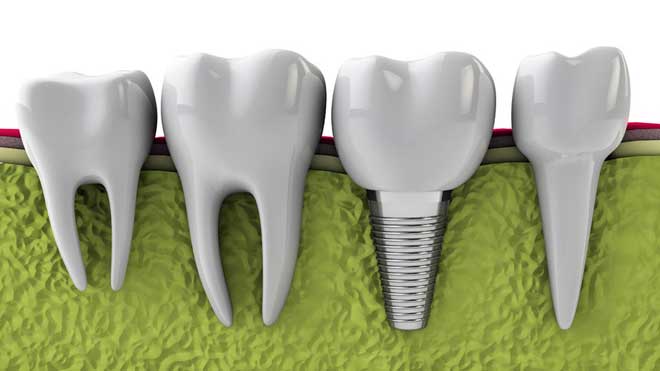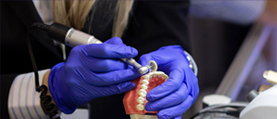Dental implants are metal screws which works as artificial tooth root inserted in the jawbone, which gets embedded in the bone by bone tissues allowed to grow around it, making it totally in entrenched, which can then support one or more tooth crowns on top of it with the help of tools mounted on the screw.
Usually dental implants work very well if they are given enough time to get surrounded by bone tissues of the gums. But some people do experience dental implant failure. There is very low ratio of dental implant failure with the success rate, but a small number of implants do fail.
Most of the time problems and troubles start to occur soon after the dental procedure around 3 to 4 months, but it may happen many years later also.
Some degree of pain and discomfort is always expected after the surgery since it is an invasive surgery, and it takes a few days to heal. To ease the pain and discomfort your dentist will have prescribed pain relievers and antibiotics to prevent infection from the surgery, and it should help. The pain and discomfort should ease in a week or two. The complete healing will take about 3 to 6 months. There can be many causes for dental implant failure among them infection is the most common.
Top causes of dental implant failure
The top 5 causes of dental implant failure are the following.
Gum disease
Gum disease is an infection in the gums, which can damage the jawbone and gums. It could be a result of bad oral hygiene of smoking. Infection can set in while the procedure is on, or it can develop after the surgery.
The dentist will ascertain clean and healthy gums before he begins the procedure but sometimes infection gets noticed after the procedure. Some patients have the auto immune disease and cannot heal themselves due to the disease. If gum disease was not located or treated before the procedure, it will surround the new implant and infect the nerve tissues that has grown around the implant. When these tissues get infected it dislodges the screw and cause it to come apart from the jaw.
Depleted jawbone
Implants need enough bone to let it stay in place. There are many conditions in which bone density is decreased. Osteoporosis is one reason why bone density decreases, and the bone becomes porous. In such a condition the implant loses support of the bone and gets loosened, which makes the crown sitting on top of the implanted screw can fall off. With advancing age, osteoporosis bones happen due to lack of calcium in the bones. Bone loss also occurs in people with severe gum disease.
Medical complications in the patient
Sometimes the dental surgery has taken place without the knowledge of the medical condition of the patient. Diabetes, rheumatoid arthritis auto immune disease are some of the conditions in which the healing process is not completed, or is slowed down. When healing is not done at a desirable rate, the osseointegration does not take palace. Osseointegration allows the implant to fuse with the jawbone.
The patient may develop certain disease like cancer after the dental implant surgery which brings upon the additional care as the cancer itself and the medication required to control and cure the tumour may interfere with the tissues that have been generated around the implant.
Sometimes the medicines that are prescribed for a specific medical condition is interfered by the medicines prescribed for healing and maintain the tissue growth around the implant. This makes the implants unstable and may lead to failure.
These and other medical conditions require the patient to take certain medicines. It is very important for the dental surgeon to know about the prescriptions that the patient is on. If the patient has not talked about his diseases and medications with the dental team, then the chances of healing will be compromised.
Oversight on the part of the surgeon
Most surgeons are trained in their craft and are well versed in the art of dental implant surgeries. But sometimes, I bad referral may result in going to an inexperienced surgeon who may lead to failure of dental implant because of not studying about the patient’s medical history and their present physical health.
There is a possibility of nerve or tissue damage when the implant is placed too close to a nerve. This condition is signified by tingling sensation in the tongue or gums and lips or even face.
Foreign body rejection can be a reason for failure of implant. It is not very common in dental implants, but it does happen sometimes. When the body rejects the implant, it appears in increased pain at the site of implant, fever and swelling in the gums.
An implant placed in upper jaw may protrude in the sinus cavities above the jaws.
Sometimes during accidents, an injury caused in the jaw may loosen the implant and it may fall off.
Too many crowns placed on a few implants may result in failure because of too much stress and pressure on the implants.
A dental surgeon must work on teeth and surrounding areas of gums and jawbone while performing the surgery. When a lot of handling is experienced, there is a possibility of trauma in the area. A lot of dental pressure results in dental trauma leading to failure.
Poor oral hygiene
The patient is required to follow a strict plan for good oral hygiene, after the dental implant surgery. Good dental hygiene has a direct impact on the recovery rate of the patient. You need to be fit to complete the strict rules of brushing and flossing after meals or as your dentist has instructed. You also need to follow your dentist’s instructions about choice of food and habits of lifestyle.
If you choose a good dental surgeon and follow their instructions perfectly, then there is very little chance of any complications and your implants will last you a long time.




